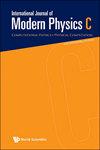用DTM研究两板间旋转微极流体的MHD流动
IF 1.6
4区 物理与天体物理
Q3 COMPUTER SCIENCE, INTERDISCIPLINARY APPLICATIONS
引用次数: 0
摘要
本文章由计算机程序翻译,如有差异,请以英文原文为准。
MHD Flow of a Rotating Micropolar Fluid between Two Plates by using DTM
求助全文
通过发布文献求助,成功后即可免费获取论文全文。
去求助
来源期刊

International Journal of Modern Physics C
物理-计算机:跨学科应用
CiteScore
3.00
自引率
15.80%
发文量
158
审稿时长
4 months
期刊介绍:
International Journal of Modern Physics C (IJMPC) is a journal dedicated to Computational Physics and aims at publishing both review and research articles on the use of computers to advance knowledge in physical sciences and the use of physical analogies in computation. Topics covered include: algorithms; computational biophysics; computational fluid dynamics; statistical physics; complex systems; computer and information science; condensed matter physics, materials science; socio- and econophysics; data analysis and computation in experimental physics; environmental physics; traffic modelling; physical computation including neural nets, cellular automata and genetic algorithms.
 求助内容:
求助内容: 应助结果提醒方式:
应助结果提醒方式:


